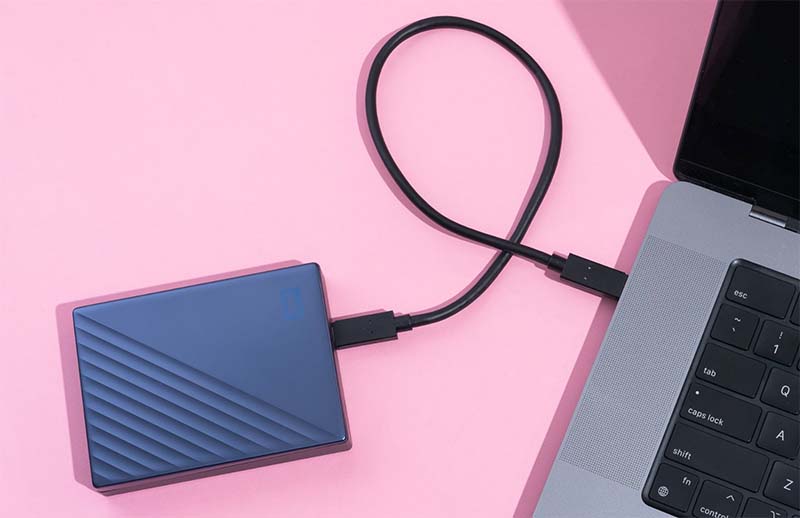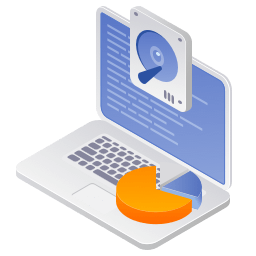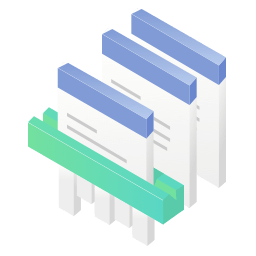PAGE CONTENT:
External hard drives are incredibly convenient storage devices, offering portability and additional space for your computer. However, when an external hard drive causes your computer to freeze or crash, it can be extremely frustrating. Whether you're in the middle of a critical task or simply trying to access files, a freeze can halt your productivity and leave you searching for answers. This article explores the common reasons why external hard drives can cause your computer to freeze and provides a step-by-step guide on how to fix this issue.

Why Does an External Hard Drive Cause My Computer to Freeze?
Before jumping into solutions, it's important to understand the potential causes behind this issue. Various factors can contribute to external hard drives causing system freezes, including hardware issues, software conflicts, and outdated drivers.
1. Hardware Issues
Hardware problems are one of the most common causes of external hard drives freezing a computer. These issues may involve faulty cables, a damaged USB port, or problems with the hard drive itself.
- Faulty USB Cable: A broken or damaged USB cable can prevent the external hard drive from connecting properly to the computer, which may cause it to become unresponsive and freeze your system.
- Incompatible or Overloaded Ports: If your computer's USB ports are malfunctioning or overloaded (too many devices connected at once), this can cause conflicts and freeze your system.
- Faulty External Hard Drive: Sometimes, the issue lies within the hard drive itself. If the hard drive has gone through physical damage, such as from drops or other impacts, or has developed bad sectors, it can cause your computer to freeze when you try to access it.
2. Software Conflicts
External hard drives require specific drivers to work seamlessly with your operating system. If these drivers are outdated, incompatible, or corrupted, it can cause your system to freeze when the drive is connected.
- Outdated or Corrupted Drivers: The external hard drive may not function correctly if the necessary drivers aren't up to date. This can create a conflict between the drive and your computer's operating system, causing your system to become unresponsive.
- Operating System Conflicts: Sometimes, software conflicts between your operating system and other programs or utilities (like antivirus software or disk management tools) can cause issues when connecting external devices.
3. Power Management Issues
External hard drives require power to function. If there are power-related issues - either with the drive itself or with the way your computer handles power - this can cause your system to freeze.
- Power Supply Problems: Some external hard drives require more power than others, especially when they feature higher storage capacities or are spinning hard drives (HDDs). If the power supply is insufficient, the drive may malfunction and cause your system to freeze.
- Power Settings on Your Computer: On some systems, the power-saving settings might cause the external hard drive to enter a low-power state, preventing it from functioning properly and causing freezes.
Fix the External Hard Drive Freezes Computer Issue: Step-by-Step Guide
Now that we've covered some common causes, let's look at the solutions. These troubleshooting steps should help you resolve the issue of an external hard drive freezing your computer.
Step 1: Check the USB Cable and Ports
The first thing you should do is check your hardware for any obvious issues. Inspect your external hard drive's USB cable for any visible signs of damage, such as frays or bends. If the cable is damaged, replacing it with a new one may resolve the issue.
Next, ensure that the USB ports on both your computer and the external hard drive are functioning correctly. Attempt to attach the external hard drive to a different USB port if your computer has more than one. Sometimes, specific ports may not be able to supply enough power or may be malfunctioning, leading to connectivity issues.
Step 2: Try a Different Computer
Try connecting the external hard drive to a separate computer to rule out whether the problem is with your computer or the drive itself. If the external hard drive works fine on the other system, it's likely an issue with your computer's configuration or software. If the drive still causes freezes on the other computer, there may be an issue with the drive itself.
Step 3: Update or Reinstall Drivers
Outdated or corrupted drivers can cause a range of issues, including system freezes. To fix this, you should update the drivers for your external hard drive.
- Update the Driver (Windows):
- To access Device Manager, choose Device Manager from the Start menu with a right-click.
![choose Device Manager from the Start menu with a right-click]()
- Go to the Disk drives section and find your external hard drive.
- To update the driver, right-click on it and choose Update driver.
![right-click on it and choose Update Driver]()
- Select Search automatically for drivers. Windows will install a newer driver automatically if one is available.
![Select Search automatically for drivers]()
- To access Device Manager, choose Device Manager from the Start menu with a right-click.
- Reinstall the Driver (Windows):
- If updating the driver doesn't solve the problem, uninstall the driver and reinstall it.
- In Device Manager, right-click the external hard drive and select Uninstall device.
![Reinstall the Driver (Windows)]()
- After uninstalling, disconnect the drive and restart your computer.
- When you reconnect the external hard drive, Windows will attempt to reinstall the necessary drivers.
- For macOS:
On a Mac, external hard drives usually don't require specific drivers, but the issue could be related to the file system format. Ensure your external drive is formatted in a compatible file system (like exFAT or APFS/HFS+ for Mac).
Step 4: Check for Disk Errors
Your external hard drive could have underlying disk errors that are causing the freeze. Windows provides a built-in tool called Check Disk (CHKDSK) to scan and repair disk problems.
- Find your external hard disk by using File Explorer.
- Choose Properties with a right-click on the drive.
- Select Check under Error checking under the Tools tab.
![Check for Disk Errors]()
- Allow Windows to scan and correct any disk issues by following the on-screen directions.
On macOS, you can use Disk Utility to verify and repair the drive. Open Disk Utility from the Applications under Utilities folder, select your external hard drive, and click on First Aid to perform repairs.

Step 5: Adjust Power Settings
Sometimes, power-saving settings can interfere with external hard drives, causing freezes. To prevent this from happening:
- On Windows:
- Open the Control Panel and navigate to Power Options.
- Next to your existing electricity plan, select the Change plan settings option.
- Select the option to modify the advanced power settings.
- To broaden the USB settings, scroll down. Disable the USB selective suspend setting.
- On macOS:
- Go to System Preferences > Energy Saver (or Battery on newer Macs).
- Disable any settings that allow the computer to turn off USB devices to save power.
Step 6: Try a Powered USB Hub
If your external hard drive is a high-capacity model or requires more power, consider using a powered USB hub. These hubs come with their own power supply and ensure that your external drive receives sufficient power, reducing the chances of freezes caused by power-related issues.
Step 7: Check for Software Conflicts
Software conflicts, especially with antivirus programs or disk management utilities, can sometimes cause problems when connecting external devices. Try temporarily disabling your antivirus software or any third-party disk management tools to see if that resolves the freeze.
Step 8: Format the External Hard Drive (Last Resort)
If none of the above solutions work and the external hard drive still causes freezing, it may be worth considering a full format of the drive. Note: Because formatting will remove all data from the drive, make sure you have a backup of your most important information before beginning.
- Launch Disk Utility (for macOS) or Disk Management (for Windows).
- Find the location of the external hard disk.
- Choose Format or Erase, and follow the prompts to complete the process.
Related link: How to format external hard drive on Windows or macOS >>
Note: If you have lost data from your external hard drive, you can use data recovery program - such as Donemax Data Recovery to recover the deleted or formatted data.
Prevent Future 'External Hard Drive Freezes the Computer'
Once you've resolved the issue, take steps to prevent future freezes.
- Regularly Update Drivers and Software: Make sure your system and external hard drive drivers are always up to date.
- Use Quality Cables and Hubs: Invest in high-quality cables and powered USB hubs to avoid hardware-related issues.
- Keep the Hard Drive in Good Condition: Avoid physical damage to the external hard drive, and ensure it's used in safe environments.
Conclusion
When your external hard drive freezes your computer, it's not just an inconvenience - it can be a sign of a deeper issue. Whether the problem stems from faulty hardware, outdated drivers, or power management conflicts, following these steps can help you identify the root cause and fix the issue. By carefully troubleshooting and addressing the problem, you can ensure that your external hard drive functions properly without causing your computer to freeze in the future.
If you have lost data due to fixing 'external hard drive freezes my computer,' you can use data recovery program - such as Donemax Data Recovery to recover the lost data from the external hard drive.


Donemax Data Recovery
Donemax Data Recovery is one of the best data recovery software. It is easy-to-use and can help in recovering deleted, formatted, inaccessible or lost data from HDD/SSD, external disk, USB drive, SD card, camera or other storage devices.
Related Articles
- Jan 21, 2025Fix SD Card Won't Read or Open
- Feb 11, 2025How to Repair an xD Card: A Comprehensive Guide
- Nov 09, 2024(Solved) Fix macOS Sequoia Keeps Crashing or Freezing When Starting
- Mar 01, 20259 Solutions to Fix SD Card Not Detected on Windows 11/10/8/7
- Dec 26, 2024How to Remove SD Card's Write Protection on Mac? [5 Methods]
- Dec 13, 20246 Methods to Fix Mac Won't Boot Into macOS Recovery Mode

Lucien
Lucien is a writer and a chief programmer of Donemax software who has worked in the company for 5+ years. He has written much of the content on the site and devotes to providing troubleshooting and solution for Windows and Mac users including disk cloning, data recovery, migration, eraser, error fixes.

Gerhard Chou
In order to effectively solve the problems for our customers, every article and troubleshooting solution published on our website has been strictly tested and practiced. Our editors love researching and using computers and testing software, and are willing to help computer users with their problems
Hot Donemax Products

Clone hard drive with advanced clone technology or create bootable clone for Windows/Mac OS.

Completely and easily recover deleted, formatted, hidden or lost files from hard drive and external storage device.

Certified data erasure software - permanently erase data before selling or donating your disk or any digital device.




